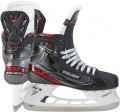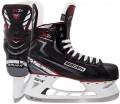Size
The boot sizes of the skates. One skate model can have a full
fixed size grid (
25,
26,
27,
28,
29,
30,
31,
32,
33,
34,
35,
36,
37,
38,
39,
40,
41,
42,
43,
44,
45,
46 size) and include both
kids skates and adults. And for models with
adjustable sizes(see "More features"), size ranges are indicated in this paragraph, while one model can be produced in several range options. For example, the designation "35-38, 39-42" means that the skates are available in two versions: one is adjustable from size 35 to 37, the second is from 39 to 42.
Sole material
— Plastic. The sole material used in most modern skates, regardless of style or price range. Such popularity is because there are many varieties of plastic on the market that differ in performance, strength and, accordingly, cost. This allows you to choose the best option for almost any type of skate. The overall quality of a plastic sole usually depends on the price category of the product. It is also worth considering that some types of this material do not tolerate temperatures below -10 °C, so when choosing, you should pay attention to the temperature limits indicated in the documentation. This is especially important when buying inexpensive skates.
— Rubber. Relatively flexible and soft material that resists low temperatures well. Nevertheless, rubber does not have fundamental advantages over the same plastic, but costs a little more, which is why it is extremely rare.
— Composite. In the case of skates, composite usually means carbon fibre — carbon fibre with a plastic filler. In terms of strength, such a material is superior to steel, it is cruel, due to which it provides a clear transfer of force from the foot to the blade of the skate while weighing very little. However, carbon fibre soles are not cheap, so they are used only in certain models of premium hockey skates (usually the entire boot is made of the same material in such models).
— Stainless steel. The material used in a rather specific type of skate: removable blades worn...over regular shoes. There is no boot in such skates as such, they consist of blades, soles and straps for attaching to shoes. Of the practical properties of steel, it is worth noting strength, durability, resistance to low temperatures and, at the same time, a rather large weight.

